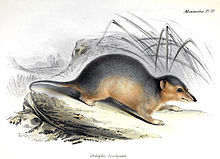Yellow-sided opossum
| Yellow-sided opossum[1] | |
|---|---|

| |
| Scientific classification | |
| Domain: | Eukaryota |
| Kingdom: | Animalia |
| Phylum: | Chordata |
| Class: | Mammalia |
| Infraclass: | Marsupialia |
| Order: | Didelphimorphia |
| Family: | Didelphidae |
| Genus: | Monodelphis |
| Species: | M. dimidiata
|
| Binomial name | |
| Monodelphis dimidiata (Wagner, 1847)
| |

| |
| Yellow-sided opossum range | |
The yellow-sided opossum (Monodelphis dimidiata) is an opossum species from South America. It is found in Argentina, Brazil and Uruguay. They have grey or black fur on their dorsal side with yellowish fur on the lateral side that continues down to the feet. They are the most mysterious of all the Monodelphis that is found specifically in the Pampean region or Pampa of Argentina. It is suspected to be a once-in-a-lifetime breeder as seen in a three-year observational study of one population in the marshy grasslands of the Pampean region. Maintaining their native grasslands is important for them to keep a stable population.[3] They show sexual dimorphism in overall size: adult males are typically 100-150 g whereas adult females are 30-70 g.
Behavior
[edit]This species displays a rich repertoire of stereotyped behaviors.[4] Postures, locomotion, and grooming are similar to those of other didelphids. They carry nest materials using their short but still prehensile tails.[4]

Both males and females hunt insects and small vertebrates, and show specialized behaviors for dealing with difficult prey.[4] Large insects are attacked rapidly and the head is consumed first. In contrast, hairy caterpillars are not immediately grabbed; instead, the opossum scratches the caterpillar to get rid of the urticating hair.[4] Small mice are rapidly chased and attacked until a firm bite at the neck is attained, similar to the throat clamp used by large carnivores.[4]
M. dimidiata is thought to be a miniature analog to the marsupial sabertooths Thylacosmilus. Like extinct sabertooth predators, it has one of the largest canines of any marsupial relative to body size and was proposed as a living model to test hypotheses about hunting strategies of the extinct predators.[5]
Yellow-sided opossums also show a variety of behaviors used in social contexts, including male-to-male agonistic rituals, and a variety of vocalizations whose social or adaptive significance deserves further investigation.[4]
References
[edit]- ^ Gardner, A.L. (2005). "Order Didelphimorphia". In Wilson, D.E.; Reeder, D.M (eds.). Mammal Species of the World: A Taxonomic and Geographic Reference (3rd ed.). Johns Hopkins University Press. p. 14. ISBN 978-0-8018-8221-0. OCLC 62265494.
- ^ Teta, P.; Martin, G.M. (2016). "Monodelphis dimidiata". IUCN Red List of Threatened Species. 2016: e.T13693A22170430. doi:10.2305/IUCN.UK.2016-1.RLTS.T13693A22170430.en. Retrieved 12 November 2021.
- ^ Baladrón, Alejandro V. Population Dynamics of the Southern Short-tailed Opossum (Monodelphis Dimidiata) in the Pampas of Argentina. CSIRO PUBLISHING. Australian Journal of Zoology, Web. 01 Dec. 2013.
- ^ a b c d e f González, E.M.; Claramunt, S. (2000). "Behaviors of captive Short-tailed Opossums, Monodelphis dimidiata (Wagner, 1847) (Didelphimorphia, Didelphidae)". Mammalia. 64 (3): 271–286. doi:10.1515/mamm.2000.64.3.271. ISSN 0025-1461. S2CID 84782113.
- ^ Blanco, R. E., Jones, W. W., & Milne, N. N. (2013). Is the extant southern short-tailed opossum a pigmy sabretooth predator?. Journal of Zoology, 291(2), 100-110.

